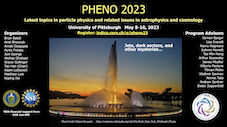Speaker
Description
In this talk, I will motivate the study of models of dark radiation. Dark radiation models might have a rich phenomenology, with imprints on cosmological observables. Upcoming CMB and LSS measurements will be sensitive to different signals, which makes the exploration of Dark radiation imprints timely. Moreover, we recently showed that Dark radiation might be an asset in solving the Hubble and $S_8$ tensions.
I will concretely show how a light ($m_{\nu D} \underset{\raise.3ex\hbox{$\sim$}}{<}$ MeV) dark fermion mixing with the Standard Model neutrinos can naturally equilibrate with the neutrinos via oscillations and scattering. In the presence of dark sector interactions, the production of dark fermions is generically suppressed above BBN, but then enhanced at later times. Over much of the parameter space, we find that the dark sector equilibrates, even for mixing angles $\theta_0$ as small as $10^{-13}$, and equilibration naturally occurs at most a few orders of magnitude above the dark fermion mass. The implications of this are twofold: one, light states are often only constrained by the CMB and LSS without leaving an imprint on BBN, and two, such sectors that equilibrate before recombination will typically have a mass threshold before recombination. Different regimes of parameter space, as well as different spectra and interactions of the dark sector, have different and model-dependent signatures on the CMB and LSS, opening the door for future studies.
